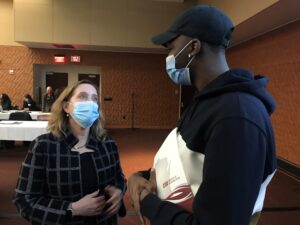Building on the Math Initiative Foundation
UW universities continue to implement strategies promoted through the Math Initiative, which are described below. Each institution also participates in the Math Steering Committee, which is now co-chaired by Kevin McLeod of UW-Milwaukee and Alex Smith of UW-Eau Claire.
Work in 2022-2023 included development and distribution of a joint statement on developed by UW System, Wisconsin Technical College System representatives, and two Wisconsin mathematics professional organizations, and informational sessions with the College Board on AP Precalculus (new AP course for 2023-24) and the UW Center for Placement Testing.
Find members of the Project Team, Math Steering Committee, and Joint College Readiness in Mathematics Statement Committee members in About Us.
For information, please contact Sandra Kallio at sandra.kallio@wisconsin.edu.
UW System Math Initiative 2017-2021
This multi-institutional collaboration of UW faculty, staff, and administrators was designed to improve student success by helping incoming students complete a gateway mathematics course by the end of their first two semesters of study. The Math Initiative worked directly with UW institutions from 2017 to 2021 to review national models, better meet our students’ needs, and enable them to achieve their educational goals. Systemwide progress includes an 11 percentage point reduction in student placement in pre-requisite developmental math and significant increases in transfer for all three most common gateway math courses between UW System institutions: from 78% to 94% for College Algebra, 80% to 90% for Statistics, and 62% to 80% for Quantitative Reasoning.
Results at the institutional level included dramatic improvements, as described in the December 2021 presentation to the UW System Board of Regents. UW-Parkside, for example, totally eliminated developmental level mathematics, and UW-Milwaukee had eliminated all but one developmental mathematics course by the end of the grant-funded period. These data-informed changes support student success, retention, and progress toward degree. In addition, UW-Milwaukee was among the institutions that greatly expanded the Quantitative Reasoning math pathway, as they determined course learning outcomes better prepared students for success in nursing, public health, and business programs at their institution.
The initiative built on many years of foundational work on math education from across the UW System. It began in 2017, when Jim Henderson, then-Vice President for the UW System Office of Academic and Student Affairs, launched the Math Initiative with financial and administrative resources. In January 2018, Ascendium Education Group (the former Great Lakes Higher Education Corporation & Affiliates) awarded a multi-year $2.3 million grant to help UW System advance Math Initiative goals.
This initiative was led under the direction of Alice Pulvermacher, Principal Investigator and Associate Director of the UW System Office of Academic Innovation, and Math Initiative project team members: Jennifer Kosiak, UW-La Crosse mathematics professor and former UW System Math Steering Committee Chair; Carrie Tirel, mathematics associate professor at the Fox Cities Branch Campus of UW Oshkosh and former Vice Chair of the UW System Math Steering Committee; David Blough, Senior Policy and Planning Analyst in the UW System Office of Policy Analysis and Research; and Sandra Kallio, Senior Editor in the Office of Academic Innovation. Anny Morrobel-Sosa, Vice President for the UW System Office of Academic and Student Affairs, became the Executive Sponsor from 2019 to 2021.
The Math Initiative engaged more than 350 faculty, staff, and administrators from UW System institutions. They represented mathematics departments and faculty and staff from partner disciplines: arts and humanities, social and behavioral sciences, math, and other STEM programs in 2018; and business, education, and nursing in 2019. Administrators, advisors, and institutional researchers were included throughout the funding period. Starting in 2020 and continuing in 2021, the focus shifted to strategies such as active learning (online, hybrid, and in-person) and co-requisite math courses to support student success in developmental and gateway mathematics.
Read a few about this initiative.
In the News
-
UW-Parkside Recognized for Student Success and College Completion
The American Association of State Colleges and Universities (AASCU) has awarded UW-Parkside the 2022 AASCU Excellence & Innovation Award for Student Success and College Completion. UW-Parkside leaders highlighted their strategic […]
-
Change: The Magazine of Higher Learning
How a System Change Framework Supports Cultural Change, co-authored by Alice Pulvermacher and Sandra Kallio, was published by Taylor & Francis in Change: The Magazine of Higher Learning on March 2022, […]
-
The Evolllution
Professional Development in a Pandemic — Part 2
-
The Evolllution
Professional Development in a Pandemic — Part 1
-
UW System
Faculty and instructors sharing their experiences applying student engagement strategies in remote teaching during UW System Math Initiative Showoff/Showdown
“I really enjoyed this class. I was nervous about it ahead of time because I never thought I would be able to understand Abstract Algebra, but I understood a lot more than I thought I was going to. I owe a lot of that to the way Dr. McCabe organized the class and set up the group activities we did in class.”
“Despite not being in the physical classroom, the breakout rooms brought the classroom to life and helped me to connect with peers.”
Students’ comments on active learning strategies incorporated by Cindy McCabe, Chair, UW-Stevens Point Mathematical Sciences
Find student success strategies shared through Math Initiative professional development
“What I especially appreciate about the UW System Math Initiative is that it incorporates support for both structural and instructional change. The depth of faculty engagement is a model for others.”
Sue Cui, Senior Program Officer, Ascendium Education Group
Priorities 2017-2021
- Increase enrollment rates in a math course in the student’s first year.
- Reduce the number of students placed into developmental math courses.
- Improve the success of students in developmental math courses.
- Improve the success of students in their first credit bearing math courses.
- Ensure transferability of gateway math courses within UW System.
Strategies 2017-2021
- Implement common cut score for math placement
- Make data-driven decisions on multiple measures for math placement and early enrollment in gateway math
- Create or expand bridge programs, math pathways and co-requisite courses
- Implement evidence-based student success strategies, such as active learning, growth mindset, building community and increasing student engagement
- Develop gateway math common course descriptions and learning outcomes to support seamless transfer among UW System institutions as well as other Wisconsin higher education institutions
UW System Gateway Math Courses
The University of Wisconsin System Math Steering Committee representing all 13 institutions developed, vetted and finalized course descriptions and learning outcomes for the most common gateway mathematics courses/course sequences in the system and developed a document to guide implementation of co-requisites for gateway math:
UW System Math Initiative representatives since have been sharing the course descriptions and learning outcomes with Wisconsin educational partners, such as:
- Wisconsin Technical College System
- Wisconsin Association of Independent Colleges and Universities
- Wisconsin Mathematics Council
- Wisconsin section of the Mathematics Association of America
- Wisconsin PK-12 education administrators and high school mathematics instructors
Outreach to secondary education also has included venues, such as:
- Wisconsin School Counselor Association
- Wisconsin Department of Public Instruction (DPI)
- Curriculum and instruction Cooperative Educational Service Agency district representatives
- UW-Madison Professional Learning and Community Engagement College Readiness in Math Symposium
Math Initiative Videos
Shortening Math Pathways
Paving a New Pathway to Success
Building on Student Centered Strategies
Working Across Disciplines
Collaborating Systemwide
Supporting Student Success
Removing Barriers to Student Success
Watch the Math Initiative Dec. 9, 2021, presentation to the UW System Board of Regents Education Committee here.


